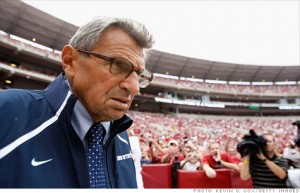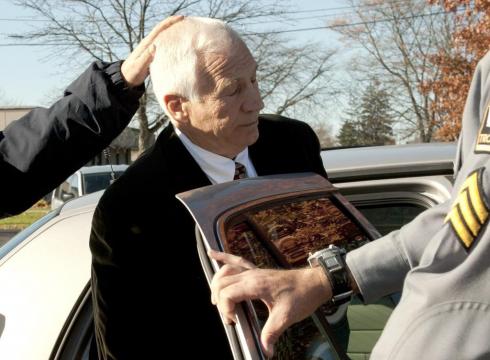The penalties resulting from the Penn State scandal were imposed this morning but truth be told I do not think they were enough. The death penalty was the only penalty that would have been strong enough with this fiasco. The NCAA has hit Penn State with a $60 million sanction, a four-year football postseason ban and a vacation of all wins dating to 1998, the organization said Monday morning.
 “These funds must be paid into an endowment for external programs preventing child sexual abuse or assisting victims and may not be used to fund such programs at the university,” the NCAA said in statement.
“These funds must be paid into an endowment for external programs preventing child sexual abuse or assisting victims and may not be used to fund such programs at the university,” the NCAA said in statement.
The career record of former head football coach Joe Paterno will reflect these vacated records, the statement continued.
Penn State must also reduce 10 initial and 20 total scholarships each year for a four-year period, the release said.
The NCAA revealed the sanctions as NCAA president Mark Emmert and Ed Ray, the chairman of the NCAA’s executive committee, and Oregon State’s president spoke at a news conference in Indianapolis at the organization’s headquarters.
“In the Penn State case, the results were perverse and unconscionable,” Emmert said.
“No price the NCAA can levy with repair the damage inflicted by Jerry Sandusky on his victims,” he said, referring to the former Penn State defensive coordinator convicted of 45 counts of child sex abuse last month.
The NCAA said the $60 million was equivalent to the average annual revenue of the football program.
The NCAA’s announcement followed a day after Penn State removed Joe Paterno’s statue outside Beaver Stadium, a decision that came 10 days after a scathing report by former FBI director Louis J. Freeh found that Paterno, with three other top Penn State administrators, had concealed allegations of child sexual abuse made against Sandusky.
The Freeh report concluded their motive was to shield the university and its football program from negative publicity.
The NCAA took unprecedented measures with the decision to penalize Penn State without the due process of a Committee on Infractions hearing, bypassing a system in which it conducts its own investigations, issues a notice of allegations and then allows the university 90 days to respond before a hearing is scheduled.
Following the hearing, the Infractions Committee then usually takes a minimum of six weeks, but it can take upwards of a year to issue its findings.
But in the case of Penn State, the NCAA appeared to use the Freeh report — commissioned by the school’s board of trustees — instead of its own investigation.
“We cannot look to NCAA history to determine how to handle circumstances so disturbing, shocking and disappointing,” Emmert said in the statement. “As the individuals charged with governing college sports, we have a responsibility to act. These events should serve as a call to every single school and athletics department to take an honest look at its campus environment and eradicate the ‘sports are king’ mindset that can so dramatically cloud the judgment of educators.”
It was believed the NCAA Division I Board of Directors and/or the NCAA Executive Committee granted Emmert the authority to punish through the nontraditional methods, a source told ESPN’s Joe Schad on Sunday.
Penn State athletics had been given no indication from the NCAA about what sanctions or penalties were to be levied on the department and football program, a source with direct knowledge of the situation in State College told ESPN.com’s Andy Katz on Sunday night. If this were a traditional infractions case, the athletic department would have known up to 24 hours in advance.
the department and football program, a source with direct knowledge of the situation in State College told ESPN.com’s Andy Katz on Sunday night. If this were a traditional infractions case, the athletic department would have known up to 24 hours in advance.
A trustee said Penn State has hired Gene Marsh, a lawyer for Lightfoot, Franklin & White in Birmingham, Ala., and a former member and chair of the NCAA Infractions Committee. Last week, ESPN contacted Marsh, who also previously represented former Ohio State coach Jim Tressel, and he refused to confirm or deny he had been retained by Penn State.
A former Committee on Infractions chairman and current Division I Appeals Committee member told ESPN.com’s Katz on Sunday the NCAA’s penalizing of an institution and program for immoral and criminal behavior also breaks new ground.
The former chair, who has been involved with the NCAA for nearly three decades, said he couldn’t use his name on the record since the case could come before him and the committee he still serves on in an appeals process.
“This is unique and this kind of power has never been tested or tried,” the former chair said. “It’s unprecedented to have this extensive power. This has nothing to do with the purpose of the infractions process. Nevertheless, somehow (the NCAA president and executive board) have taken it on themselves to be a commissioner and to penalize a school for improper conduct.”
The chair said that the NCAA was dealing with a case that is outside the traditional rules or violations. He said this case does not fall within the basic fundamental purpose of NCAA regulations.
“The purpose of the NCAA is to keep a level playing field among schools and to make sure they use proper methods through scholarships and etcetera,” the chair said. “This is not a case that would normally go through the process. It has nothing to do with a level playing field. It has nothing to do with whether Penn State gets advantages over other schools in recruiting or in the number of coaches or things that we normally deal with.”
The NCAA, the chair said, had never gotten involved in punishing schools for criminal behavior.
“The criminal courts are perfectly capable of handling these situations,” the former chair said. “This is a new phase and a new thing. They are getting into bad behavior that are somehow connected to those who work in the athletic department.
“This is an important precedent. And it should be taken with extreme care.”
Under NCAA rules covering postseason bans, players are allowed to transfer without sitting out a season as long as their remaining eligibility is shorter than or equal to the length of the ban. Only seniors could transfer and play immediately under a one-year ban, but a two-year ban would mean seniors and juniors could both transfer without penalty.
The NCAA, heavily criticized for its sometimes-ponderous pace in deciding penalties as scandals mounted at Ohio State, Auburn, USC and elsewhere, acted with unprecedented swiftness in arriving at the sanctions for a team that is trying to start over with a new coach and a new outlook.
Emmert had put the Penn State matter on the fast track. Other cases that were strictly about violating the NCAA rulebook have dragged on for months and even years. There was no sign that the infractions committee so familiar to college sports fans was involved this time around as Emmert moved quickly, no doubt aided by the July 12 release of the report by former FBI director Louis Freeh and what it said about Paterno and the rest of the Penn State leadership.
The investigation focused partly on university officials’ decision not to go to child-welfare authorities in 2001 after a coaching assistant told Paterno that he had seen Sandusky sexually abusing a boy in the locker room showers. Penn State officials already knew about a previous allegation against Sandusky by that time, from 1998.
The leaders, the report said, “repeatedly concealed critical facts relating to Sandusky’s child abuse from authorities, the university’s board of trustees, the Penn State community and the public at large.”
Sandusky is awaiting sentencing after being convicted last month of sexually abusing 10 boys over 15 years.
Emmert had warned Penn State last fall that the NCAA would be examining the “exercise of institutional control” within the athletic department, and said it was clear that “deceitful and dishonest behavior” could be considered a violation of ethics rules. So, too, could a failure to exhibit moral values or adhere to ethics guidelines.
The Freeh report also said school had “decentralized and uneven” oversight of compliance issues — laws, regulations, policies and procedures — as required by the NCAA.
Recent major scandals, such as improper payments to the family of Heisman Trophy winner Reggie Bush while he was at Southern California, and players at Ohio State trading memorabilia for cash and tattoos, have resulted in bowl bans and the loss of scholarships.
Paterno won 409 games for the school in his 46 seasons as head coach.
Information from ESPN.com senior writer Andy Katz and The Associated Press was used in this report.

